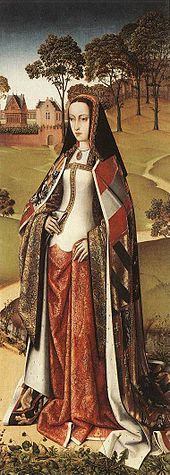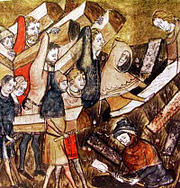Animal keeping and the use of animal products in medieval Emden (Lower Saxony, Germany)
This thesis deals with the faunal remains from several excavations in the centre of the medieval town of Emden (Lower Saxony, Germany; Figure 1-1). The aim of this thesis is to answer questions concerning the development of animal husbandry and the use of animal products in the medieval period.
Suicide in the Middle Ages
All three types of source need careful interpretation. Suicide is notoriously elusive to records even in modern times, and more so for the Middle Ages. Once due allowances have been made for each genre, however, it is some reassurance that they agree on certain basics, and that these, in turn, agree with estimates from better-recorded centuries…
Neither ill nor healthy: The intermediate state between health and disease in medieval medicine
Paradoxically, however, the notion of an intermediate state between health and disease also has a long history, harking back, at least, to the times of Galen. The question of the existence of such a state and the utility and necessity for physicians to acknowledge it, was particularly hotly debated in the Middle Ages…
The Black Death And The Future Of Medicine
This paper will specifically focus on the effects of the Black Death on medicine and medical practice in Europe. Its purpose is to investigate the Black Death’s influence on medicine, especially with regard to learned medicine and surgery.
Juana “The Mad”: Queen of a World Empire
It was not until the mid-nineteenth century that scholars discovered new material about Juana in the Spanish and Austrian archives that gave another side to the person of the woman who had been con- sidered “la loca.”
Medicine and Health Care in Later Medieval Europe: Hospitals, Public Health, and Minority Medical Practitioners in English and German Cities, 1250-1450
This interdisciplinary study, written from the standpoint ofan aspiring physician, seeks to contribute to the humanistic dimension of medicine by helping to integrate it further with its past, illuminating the meaning of health and disease in medieval society while adding depth to current thinking about medicine and public health. This study places various aspects ofhealth and disease within the framework of two major topics, religious beliefs and urban social history.
Bishopstone, Sussex – A Quiet, Rural Anglo-Saxon Village? What the Human Remains Tell Us
The primary aim of this text is the analysis and report of the skeletal human remains from the excavation of the late Anglo-Saxon settlement and cemetery at Bishopstone, East Sussex. The analysis of the skeletal remains covered the basic data: sex, age, stature, palaeopathology and dental pathology.
You Are What You Eat: Hildegard of Bingen’s Viriditas
Hildegard argues in the beginning of Physica that humans become what they eat.
Paget’s disease in an Anglo-Saxon
A recently excavated skeleton from an Anglo-Saxon burial ground at Jarrow Monastery is described.Virtually all the bones are abnormal, having the morphological and radiological features of Paget’s disease.It is one of the most convincing examples in the annals of palaeopathology and confirms the antiquity of this condition.
Maculate Conceptions
For the greater part of human history…disease has been understood in terms of its manifestations on the outside of the body. more than any other sign, t has been spots that have signified the onset of disease…
“A Swarm in July”: Beekeeping Perspectives on the Old English Wið Ymbe Charm
At the same time, however, their differing responses to the remedy attest both to the variation of beekeeping practices and the multivalence of Wið Ymbe itself. The fact that two beekeepers interviewed within two days and two hundred miles of each other can respond differently to the charm’s advice on swarms suggests that we reevaluate unilateral assertions regarding what the text might have meant across the hundreds of years that we now know as the Anglo-Saxon period.
The Virtues of Balm in the Late Medieval Period
The nature of balsam and its qualities, especially the ability to act as an extraordinarily effective preservative, demands further inquiry. Is this Lydgate’s invention, or instead a reflection of late medieval ideas about a particular natural substance?
The Lived Experience of the Black Death
To appreciate the importance of the biological effects of disease on a society’s lived experience, it can be useful to look at modern examples. Polio provides an excellent example. Children who survive an infection of polio – and escape the neurological incapacitation that can result in disability up to paraplegia – have a fifty percent chance of suffering the similar effects of post-polio syndrome later in life.
Fruit of the Womb: Prenatal Food in Renaissance Italy
One of the crucial tenants of humoral theory is the belief that females are of a colder and wetter disposition than the hotter, drier nature of males. To achieve optimal health the humors needed to be in perfect balance, as seen in all recommendations for food, drink, preparation and even environment.
The Rooster‘s Egg: Maternal Metaphors and Medieval Men
This dissertation will explore the symbolism surrounding women‘s bodies, particularly menstruating, lactating, and pregnant bodies, which concerned theologians, moralists, and medical writers alike.
Plague And Changes In Medieval European Society And Economy In The 14th And 15th Centuries
Standards of hygiene in the Middle Ages appeared high enough to prevent diseases as medieval Europeans, contrary to popular beliefs, bathed quite often. However, contact with domestic animals, which were frequently kept in the part of the house reserved for human activity, exposed people to animal-related diseases passed to humans via insects.
Comparing Pilgrim Souvenirs and Trinity Chapel Windows at Canterbury Cathedral
The story begins with two tin pilgrim ampullae2 made before 1220 in Canterbury, England, that were found centuries later, one in France (now in the Cluny Museum) and one in Norway (now in the Historical Museum in Bergen, Norway).
Madness and Gender in Late-Medieval English Literature
Madness has been long misrepresented in medieval studies. Assertions that conceptions of mental illness were unknown to medieval people, or that all madmen were assumed to be possessed by the devil, were at one time common in accounts of medieval society.
Health and dietetics in medieval preventive medicine: the health regimen of Peter of Spain (thirteenth century)
Health and dietetics constitute the basic concepts of preventive medicine constructed by medieval and Latin Galenism, i.e. the medical theories of Galen (second century) transmitted by Arab commentators (Avicenna, among others). Over time, the concept of health with respect to the human body changed according to specific socio-historic contexts.
Bearing the Cross: Syphilis and the Founding of the Holy Cross Hospital in Fifteenth-Century Nuremberg
As syphilis crept up from southern Italy the Nuremberg city council, like many leaders elsewhere, prepared for the impending onslaught of this mysterious new disease. As the highest political authority in the city, the council considered the health of its citizens its responsibility.
Doctors as Diplomats in the Sixth Century A.D.
In the Roman world the status of doctor as doctor was never high. When he did achieve repute or rank, that usually depended not upon his practice of medicine as such, but upon the social or political connections that accrued to him from his success in it.
The meaning of the nursing in Byzantium
Byzantine hospitals were so well organized that they may be compared with contemporary ones.
Disease and Illness in Medieval Ireland
This thesis explores various aspects of the medical system, and illness/disease for the medieval period (5th-12th centuries) in Ireland.
‘Arthritis’ in Byzantium (AD 324-1453): unknown information from non-medical literary sources
Most Byzantine physicians described several types of arthritis that resemble rheumatoid arthritis, chronic deformans polyarthritis and gout.
BLACK DEATH: The Causes and Effects of a Pandemic
It requires an enormous burden of proof for any microscopic organism to be held responsible for killing roughly 30-40 percent of the population of Europe, or an estimated 17 to 28 million people from 1347-1352. Since the isolation and description of Yersinia pestis at the end of the “golden age” of microbiology in 1894, by the Swiss-French bacteriologist Alexandre Yersin, it is widely held that the small bacterium was responsible for the Black Death and several more pandemics that followed in Europe and Asia.




















